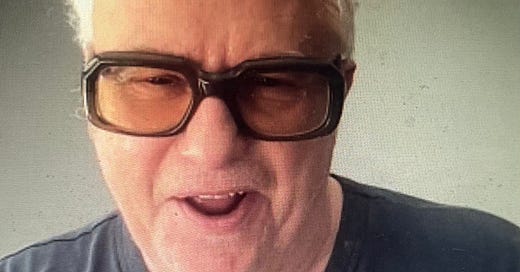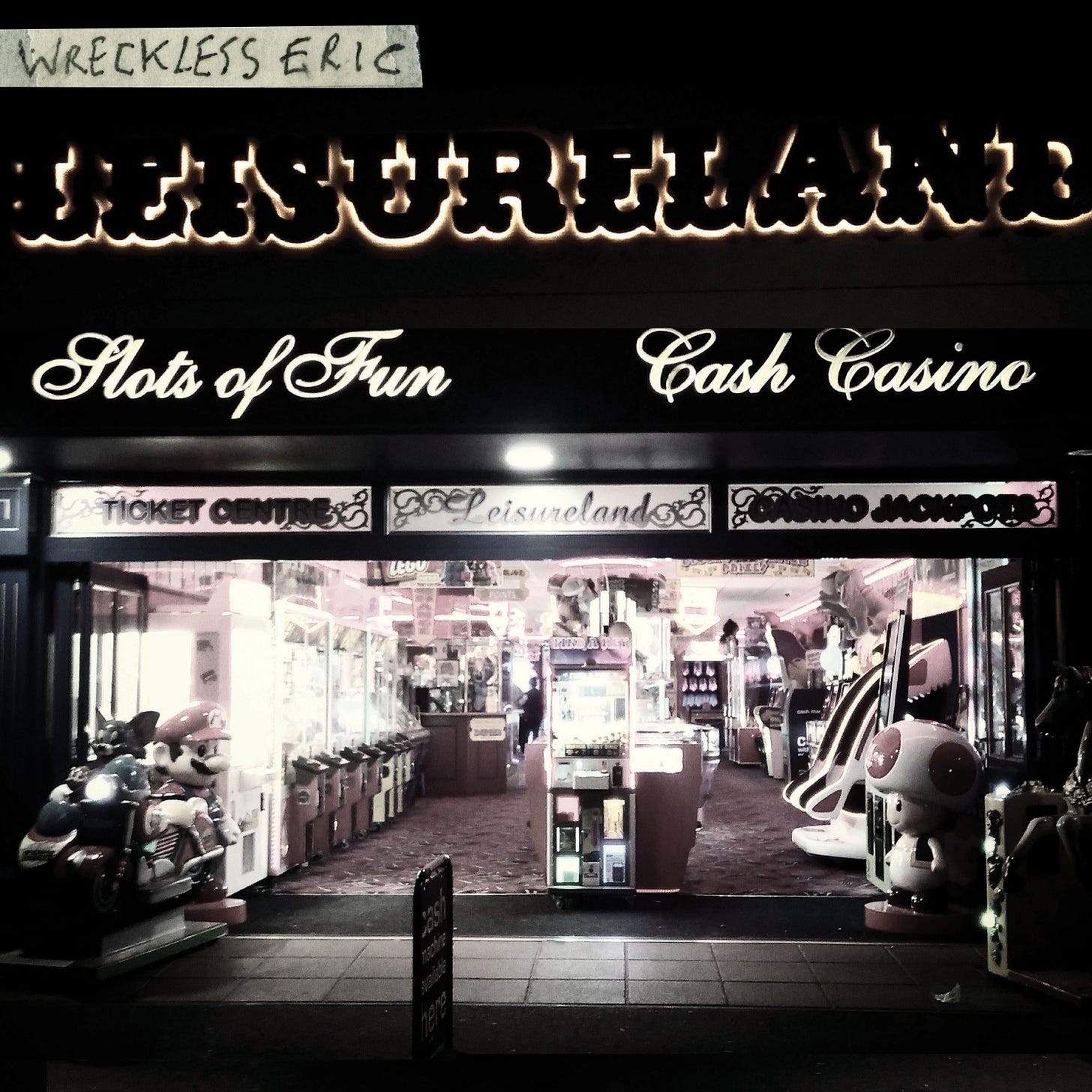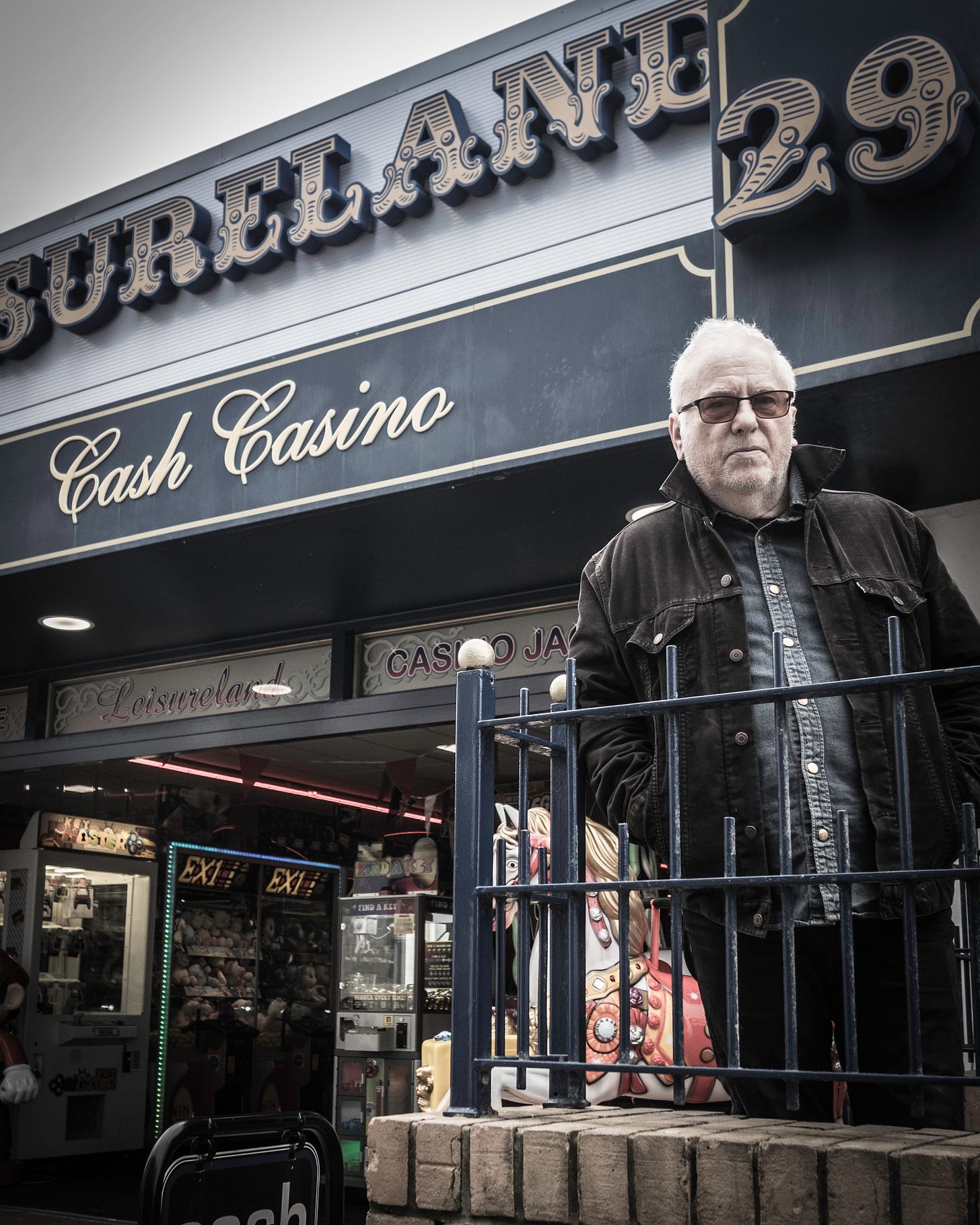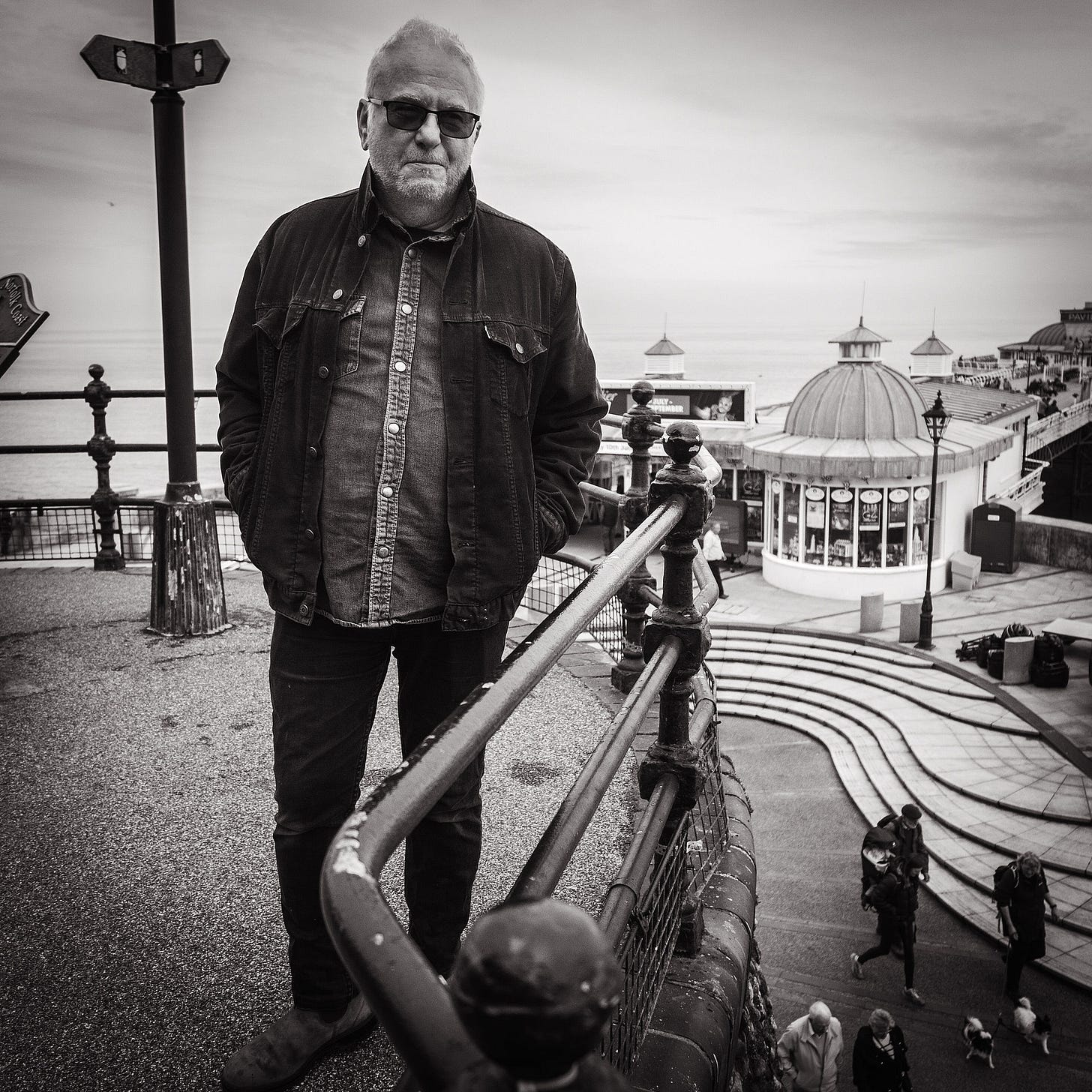The New Cue #312 August 21: Wreckless Eric
"You just have to choose what kind of hell suits you best."
Morning,
Today, we’re happy to launch your week with a zippy pow-wow with Wreckless Eric. Eric made his name in the 1970s as a punky pub-rocker on Stiff Records but is, as he approaches 70 years old, on a run of late-career magic that that has delivered four stone-cold classic albums in a row, with the latest, Leisureland, out this Friday. Have a bang on Badhat Town from it to get you in the mood.
Eric is an extremely dry and eloquent man who understands how much can be achieved during a seventeen-minute interview, even while your wife is showing prospective buyers around the flat from which you are doing the interview. Other songwriters (and their advisors) please take note.
Enjoy the edition,
Ted, Niall and Chris
Start The Week With… Wreckless Eric
With the honourable exception of Paul Weller, there isn’t a graduate of the 1976-77 punk explosion who is in quite such a glorious 21st century run of form as Wreckless Eric.
Wreckless Eric performing Whole Wide World on TV in the late ‘70s.
Known by those who know about these kind of things as a (nearly) one-hit wonder for his Whole Wide World single from ’77, as well as being a mainstay of the era’s Stiff Records stable, the erstwhile Eric Goulden has had a long and wonky career both as a solo artist and as a member of his Len Bright Combo. But since moving to the US with his American singer-songwriter wife Amy Rigby in 2011, his recording creativity has bloomed. He made three lovely records with Rigby initially and now has turned a run of four LPs in of startling originality and magnificence, patenting a kind of psychedelic barroom-Americana delivered in a thickly recognisable Estuary English accent, each filled with confessional, far-out and often funny stories. Transience, his last album from 2019, was particularly brilliant and is highly recommended.
Now aged 69, Wreckless Eric’s new album, Leisureland - a conceptual selection of songs about a fading English seaside town - is out this Friday and is the best of his recent output. A brilliant record that is also an amazing physical achievement considering Eric caught Covid early on in the pandemic. And while that didn’t quite manage to kill him, the subsequent heart-attack nearly did.
Eric survived both, happily, and was able to click on the Zoom link for one of the most enjoyable twenty-minute telecommunications of Ted’s interviewing career.
Hi Eric.
Hi, yes! How are you doing?
Alright, thanks. Where are you?
I’m in Cromer. We’re trying to move here on a permanent basis.
Oooh, why?
Have you been to the United States of America recently?
I was about to ask you the same about visiting England.
I have, I have. Nowhere is perfect, it’s true. You just have to choose what kind of hell suits you best.
You’ve been in the Catskills for a decade now. Is it no longer working out for you?
We love it. But we’re surrounded by rednecks who think the Clintons are keeping tortured babies in a basement of a pizza parlour in Washington DC. I don’t know. We’ve got the smoke coming down from Canada blocking out the sky, we’ve got the heat coming up from the South frying us to death. The climate is horrific. We come over here and it’s like, ‘It’s so easy.’ You can walk outside and it’s not either going to freeze you or melt you. And I’ve got grandchildren here – well, we both do, I share them with Amy. The kids get confused. They call her ‘that lady Amy’.
Do you think you’ll settle in Cromer?
I think so. I have an affinity with the place. I have an affinity with Norfolk generally. I moved to Norwich in the early 2000s because it was the most un-groovy place I could think of that wasn’t completely grim. I used to live in Brighton and I found it so hopelessly groovy. Everybody was writing a book or recording an album or having an exhibition or making a film…I just thought it was cultural cannibalism. I remember saying to someone that I wanted to go to some place where people tell me about their gutters. Later on, I had this house on the outskirts of Norwich and I met the woman across the road. She was real Norfolk. The first conversation we had, she drops in ‘Well, you know, I’ve been having very bad problems with my gutters’. What!?
I’m home!
It was such a relief. Her sister was a nun. They came out of the house one day and she said to her nun sister, ‘Have you seen my bush?’ It was gold, it really was. She’d worked in Whitehall, though. She had hidden depths, this woman. You should never assume anything. She once said to me, ‘They have the OBEs come out every year. Know what that stands for? Other buggers’ efforts.’ You didn’t meet people like that in Brighton.
Do you feel England’s changed in the decade you’ve been away?
Oh, it’s exactly the same. No, of course it isn’t. Well, you look at the changes to Britain over time. It changed horribly during the Thatcher era. That old wartime we’re all in it together thing got completely displaced, and this breed of very selfish and self-involved people emerged. They’re still here. But I’ve never understood how a country that is so outwardly socialist, truly socialist, is always voting in a Conservative government. I don’t know - I’m not the best person to talk about it. Who is the best person to talk about it? Nobody is. Cromer is fantastic. It’s a seaside town and everybody comes here. You could have two attitudes about it. You could say that these people are a pain in the arse, they clutter the place up, they fill the restaurants and cafes, the streets and beaches. Most of them don’t leave litter behind, though. They’re having a nice time. They get in your way, you need a cattle prod to get through town but they’re just people having a good time. And I think that’s a wonderful thing…What am I trying to tell you about how Britain’s changed?!
I don’t know.
It’s not Britain that’s changed. It’s the world that’s changed. I don’t think the British people wanted Brexit. I really don’t. That was some kind of illusion that was foisted on people. It was a great con trick. You may not think the European Union is perfect, but you have to look at alternatives. Being in the UK may not be ideal but I’m looking at the alternatives. If America was separated geographically then it would be at war with itself right now. You don’t have that here.
As you’re talking about Cromer, isn’t Leisureland loosely based upon Cromer?
I love seaside towns. I grew up on the south coast. I grew up outside of Brighton. I saw it all my young life. I’ve always gravitated to seaside towns and I’m fascinated by them. Nothing ever looks good at the seaside. Everything looks really shabby. You can’t keep anything un-shabby: the storms come in and these newly painted window-frames are just sand-blasted with salty water. Everything’s tattered. The shrubs and the trees are all pointed away from the sea where they’ve been pounded by gales. The waves chuck shingle up on to promenade. Nothing looks great. You think it’s all buckets and spades and candy floss but actually it’s all massive seasonal employment and therefore seasonal unemployment. It’s not the paradise you imagine. I like that as a setting for a story.
What made you think of Cromer while living in the Catskills?
I was here before the pandemic. I was writing bits of stuff while here. Then I came back to America just before the pandemic and I was suddenly stuck in the US and I had all these bits of crap that I’d written. I fill notebooks up with stuff. I’m not tidy about it. I’m not all ‘I have to write a song’ and then craft some wonderful tune. I write everything on scraps and then put stuff together. I’m like a collagist or something. I collect recordings or written stuff, lyrics or it could be prose. Anything. During the pandemic I had all this time on my hands as I wasn’t going anywhere. I’m always going somewhere! Suddenly I wasn’t. I had all this crap happen with Covid early on, I almost died of it. For a long time I didn’t feel very well. I was stuck in my little studio, piecing all this shit together. So I started to invent a place because, I think, I didn’t have a place to go to. The last three albums that I’ve done have had America at the centre of them. One of them is even called AmERICa. I really wanted to write about England.
I know you were very ill with Covid and a subsequent heart-attack. Are you better now?
Mostly better, but it’s taken a toll. I don’t feel as strong as I used to, but I’m also four years older so it’s hard to tell. It’s fucking shit getting old! I wanted to have a bristly little moustache and a notebook, go out on the seafront chasing down youths who were misbehaving. ‘I’m a personal friend of your headmaster’. Get my own back on society for my own youth when there was some old bloke interfering while you were quietly throwing bricks through the window of an empty house. They were always a personal friend of your headmaster.
But despite your declining old age, creatively you are at a peak. You’re on an incredible run of albums.
I was ramping up to something before me and Amy got together. We made three albums together and we’ve both been much better since we did stuff together, writing and recording. I think Amy is one of the great American songwriters. She’s the real deal. When she writes songs I can hear them as records. And she actually lets me do it! Between the two of us we make one good one. But we learned a lot from each other. We pushed each other along and my own good run of records is due to that…{Amy enters the room]. Hello?! [Amy: “They’re here in a minute”]. Ah, I have some people looking at the house and they need to come in here. How are we doing?
Five minutes?
Yes, absolutely.
Hold them off!
We’re selling this flat. It’s part of the masterplan. We ended up with a flat in Cromer. It’s complicated. It’s a crazy plan that might just come off.
OK, quickly then. Tell us about the Eric Goulden who started making music in the 1970s.
I was an art student. I knew about conceptual art. I did painting but I also suffered the whole conceptual art school experience in the early ‘70s. I came into music in the first place as a conceptual artist. I didn’t know that everyone would take everything at face value. I was really dumb.
On your website you say you were given the name Wreckless Eric because you were shy and socially dysfunctional. Why did it stick?
Definitely. Yes…[Amy is talking in the background]…I was socially dysfunctional. I was…I’ve got people here and they want to look at this room. Wreckless Eric is my brand name now. I remember thinking that The Beatles was a really uncool name by 1968 but shit. It was The Beatles. What could you say? It stood for something. I would not choose that name Wreckless Eric in a million years now. Can you do something in a million years now? I don’t know. But the thing is it’s the name of my company. It’s the name that goes on the front of the tin. I don’t worry about it anymore.
What’s the future hold for you?
I keep thinking, ‘How many records can I make before I die’? I just want to carry on making records. I’m supposed to be writing a book at the moment. There’s a plan to reissue a book I wrote twenty years ago, A Dysfunctional Success. I suppose I have to write another one, but having written one I know how difficult that is.
It’s a nice feeling when you’ve finished it though.
It’s incredible. I remember the day when it came in the post and I held it. Wow!
Good luck with that and good luck with selling your flat.
Thank you. Sell sell sell! It’s good to speak to you.
See you later.
See you later. Bye.
TK







